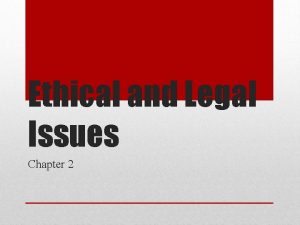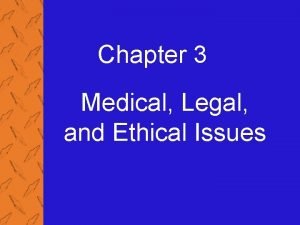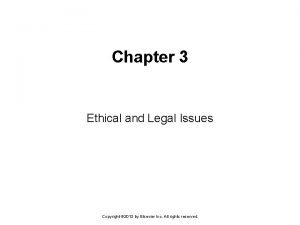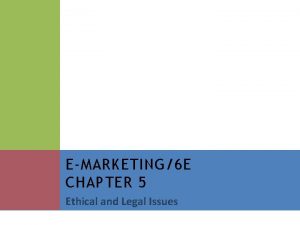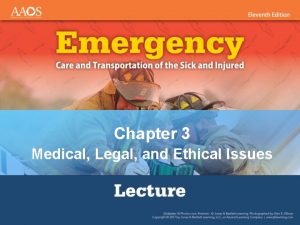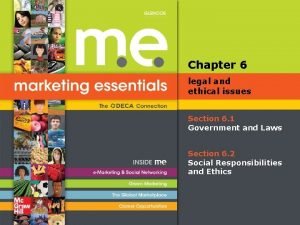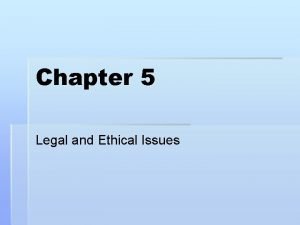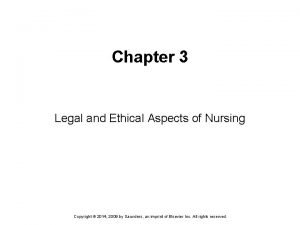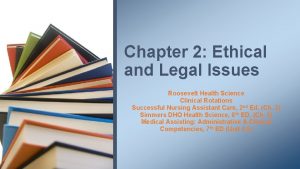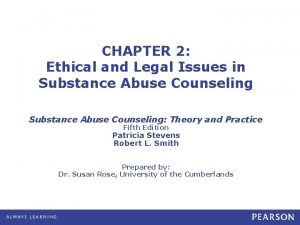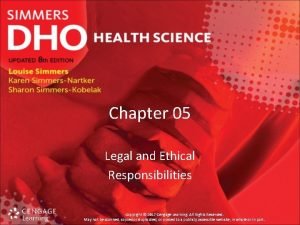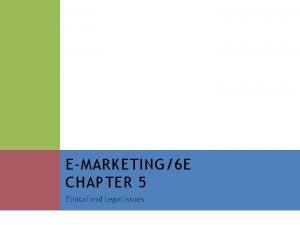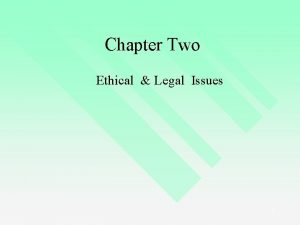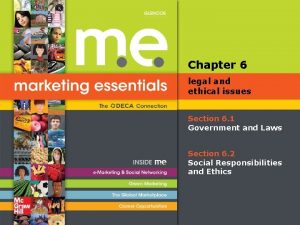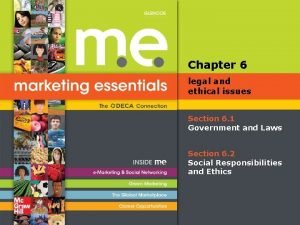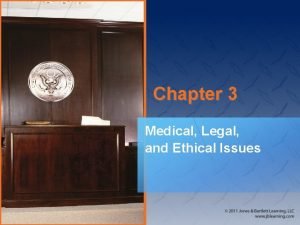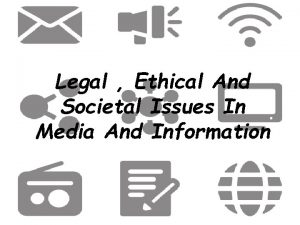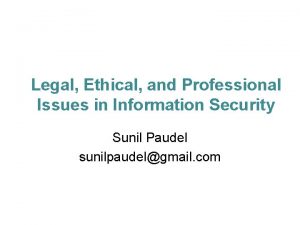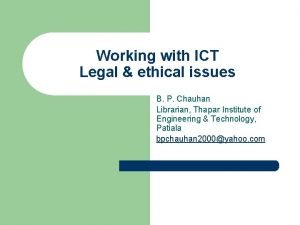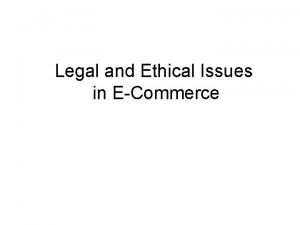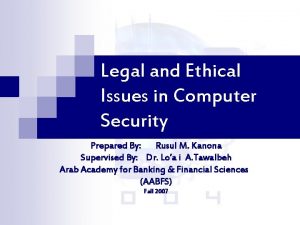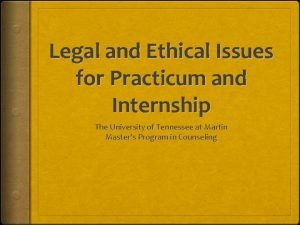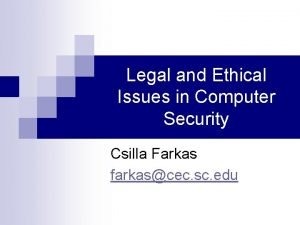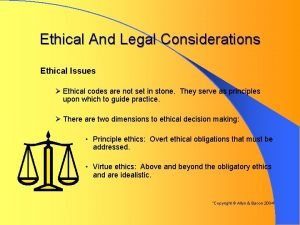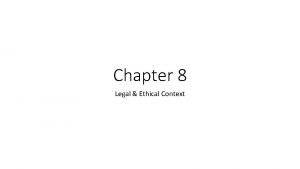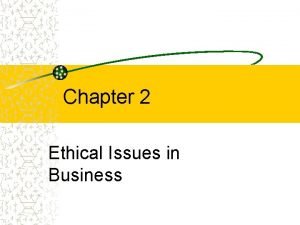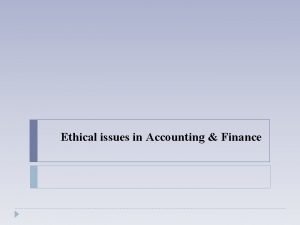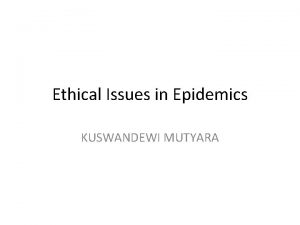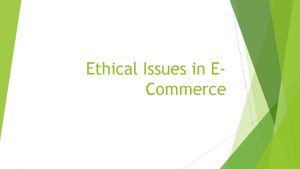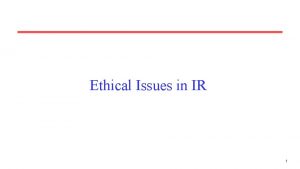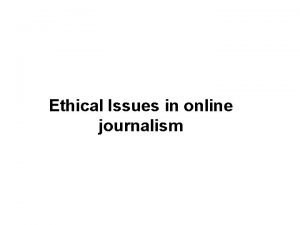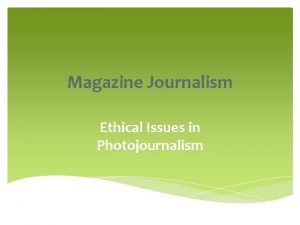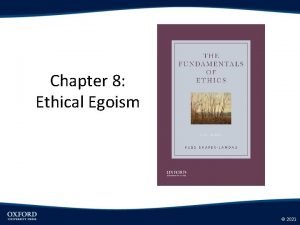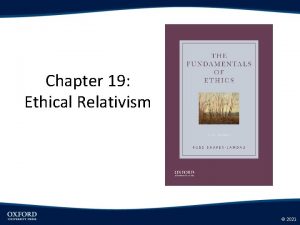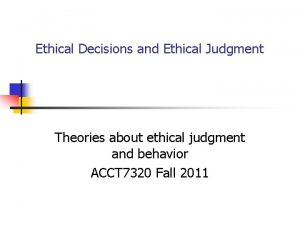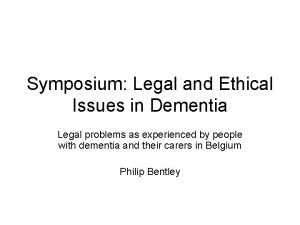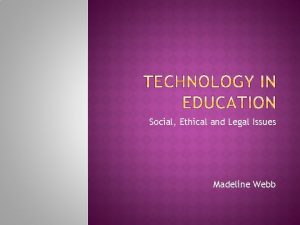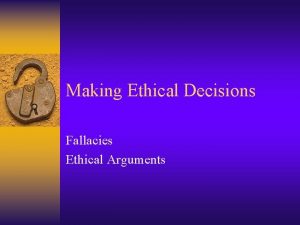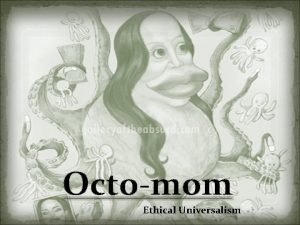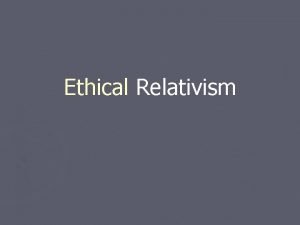Ethical and Legal Issues Chapter 2 A legal























- Slides: 23

Ethical and Legal Issues Chapter 2

• A legal concept that protects a creative work just as if it were physical property • • • Musicians Music companies Authors Personal work Photographs Safeguarding Intellectual Property

• Legal means of establishing ownership of intellectual property • Owner has legal right to restrict who may copy work • Does not prevent using work • Requires permission from copyright owner Copyright

• Idea converted into physical form • Briefest of presence • Includes digital media presence • Recording serves as physical presence • Eligible once it is shared in physical form • Copyright notice • Copyright date Name of Copyright Holder • Not a requirement to be legally protected Copyright

• Notice serves three purposes • Reminds users that work is protected • Establishes date when protection begins • Makes it easier to see permission to use work • Registration not required to be protected • Registration of copyright • Form required • Fee to U. S. Copyright Office ($35 and up) Copyright, cont.

• Exclusive right to do/authorize other to do: • Reproduce work in copies or phonorecords • a physical object in which sounds (except for the sounds that go with a movie or audiovisual work) are fixed, such as a compact disc • Prepare derivative works based on original • Distribute copies/phonorecords of work by sale, transfer of ownership, rental, lease, lending • Perform work publicly • Display work publicly • Perform work by means of digital audio transmission 1976 Copyright Act

• Created on or after January 1, 1978 • Life of author + 50 years • Created before January 1, 1978 • Brought under statute • Life = 50 years • Ask for permission to use copyrighted work 1976 Copyright Act

• Permission can be granted for free • Permission can be granted for royalty • Fee paid to the person who owns copyright on a creative work when it is used by someone else • Web sites may advertise royalty free • Images/music • Licensing agreement that gives the buyer almost unlimited permission to use a copyrighted image for a one-time fee Royalties

• Proprietary • Term used for software code that has restricted rights of use • • Owned by the company that created Software is licensed to you—you don’t own it Accept licensing limitations upon installation End-user license agreement(EULA) • Contract software purchasers must agree to before using software Software Licenses

• Open source • Software that allows others to use its code without cost • Copyright protections—copyleft • A licensing protection used by those who create open source software • Allows users to use, study, copy, share, and modify • GNU General Public License • The standard open-source contract or license Software Licenses, cont.

• File formats are proprietary—Microsoft file formats • Public domain • Creative work whose copyright restrictions have expired • Open source software Software Licenses, cont.

• Trademark • Word, phrase, or image used to identify something as a product of a particular business • Do not need to be registered • Offers protection from use by others without permission • ®--registered trademark • TM—unregistered trademark • United States Patent and Trademark Office Trademarks

• File sharing • Use of a network to move files between computers, often for illegal purposes • Copyright violation • Federal courts, U. S Supreme Court • Uploading or downloading copyrighted material without permission is violation of law • Punishable by large fines and possible imprisonment Illegal File Sharing

• Copying a product (often digital) for profit without authorization from the owner. • Music and video frequent items that are pirated • Billions of dollars are lost by companies Piracy

• Technology that prevents unauthorized copying of a digital work • Use in CDs and other media • Prevents even backup copies Digital Rights Management

• Use of copyrighted material • Fair use • The right to reproduce a small part of a copyrighted work for educational or other not-for-profit purposes without having to obtain permission or pay a royalty fee • Limited to educational copying • Very limited in commercial/business world Fair Use Guidelines

• Copying or otherwise using someone else’s creative work and claiming it as your own, usually in an academic or journalistic work, but also more recently in social media • Different from copyright infringement • Concern of academic world • Document sources to avoid plagiarism • Violation of many honor codes for educational institutions • Turnitin. com Plagiarism

• Five components • • • Author (or Web administrator) Date Title of article (or heading of page) Access date URL • Deep linking—citing a Web address that goes beyond the home or entry page Web Site Citations

• Two organizations • APA • American Psychological Association • MLA • Modern Language Association • Similar information needed for both • Differences are in capitalization, order, punctuation Citation Styles

• Help to create bibliography entries • Easy. Bib • Bib. Me Online Bibliographies

• Moral choices between right and wrong actions • Technology issues • Is it ethical to use your cell phone for personal calls while at work? • No policy against • Ethically correct? Ethics

• It is ethical to: • • • Make a model look thinner Change the color of the sky Add people to group photo Remove people from photo Distort images created by others Ethics/Photo Editing

• Consider how your actions affect others • • Does it hurt someone? Is it like stealing? Does it affect someone livelihood? Does it encourage others to do the same? Ethical Decision Making
 Chapter 2 ethical and legal issues
Chapter 2 ethical and legal issues Medical legal and ethical issues chapter 3
Medical legal and ethical issues chapter 3 Chapter 3 ethical and legal issues
Chapter 3 ethical and legal issues Legal and ethical issues chapter 5
Legal and ethical issues chapter 5 Chapter 3 medical legal and ethical issues
Chapter 3 medical legal and ethical issues Chapter 6 legal and ethical issues
Chapter 6 legal and ethical issues Chapter 5 legal and ethical issues
Chapter 5 legal and ethical issues Chapter 3 legal and ethical aspects of nursing
Chapter 3 legal and ethical aspects of nursing Ethical and legal issues chapter 2
Ethical and legal issues chapter 2 Ethical and legal issues chapter 2
Ethical and legal issues chapter 2 Chapter 5 legal and ethical responsibilities
Chapter 5 legal and ethical responsibilities Legal and ethical issues chapter 5
Legal and ethical issues chapter 5 Chapter 2 ethical and legal issues
Chapter 2 ethical and legal issues Chapter 6 legal and ethical issues
Chapter 6 legal and ethical issues Chapter 6 legal and ethical issues
Chapter 6 legal and ethical issues Medical legal and ethical issues chapter 3
Medical legal and ethical issues chapter 3 Legal and ethical issues in media
Legal and ethical issues in media Legal and ethical issues in computer security
Legal and ethical issues in computer security Legal and ethical issues in use of ict
Legal and ethical issues in use of ict What is ethical issues in e commerce
What is ethical issues in e commerce Legal and ethical issues in computer security
Legal and ethical issues in computer security Professional and ethical issues during internship
Professional and ethical issues during internship Legal and ethical issues in computer security
Legal and ethical issues in computer security Ethical and legal issues affecting the nursing assistant
Ethical and legal issues affecting the nursing assistant
